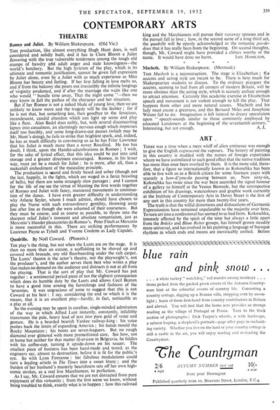CONTEMPORARY ARTS
THEATRE
Romeo and Juliet. By William Shakespeare. (Old Vic.) Tins production, like almost everything Hugh Hunt does, is well considered and solidly built, and it has in Clare Bloom a Juliet flowering with the true vulnerable tenderness among the tough old stumps of bawdry aiid adult anger and stale knowingness—the world's botchery. But the high lyricism of the play, which is its ultimate and romantic justification, cannot be given full expression by Juliet alone, even by a Juliet with as much experience as Miss Bloom has beauty and feeling. If her first falling in love melts us, and if from the balcony she pours out irresistibly the infinite longings of virginity awakened, and if after the marriage she waits like one who would " bundle time away, That the night come "—then we may know in full the pathos of the character and her situation.
But if her Romeo is not a naked blade of young love, then we are unlikely to know more and the tragedy will be the feebler ; for if he is not that, but something less, then goodbye to the ferocious, incandescent, candid abandon which can light up scene and play like a flare. Alan Badel does nobly, but, with several disconcerting lapses into casualness, an alarmingly nervous cough which impresses itself too forcibly, and some long-drawn-out pauses (which may be Mr. Hunt's doing), he fails to strike that brightest spark, and, indeed, he has as much difficulty in convincing us as he has Friar Lawrence that his Juliet is much more than a newer Rosalind. He too has dwelt, I think, upon the Hamlet-adumbrations in Romeo ; I wish, for the sake of lyrical effect, that this idea could be put into cold storage and a greater directness encouraged. Romeo, in his lesser way, must yet be a match for Juliet : he is more, after all, than a makeshift embodiment of the masculine principle.
The production is sound and firmly based and sober (though not the last, happily, in the fights, which are waged in a fierce brawling of bells), but there are some strangely slow passages ; and I cannot for the life of me see the virtue of blunting the first words together of Romeo and Juliet with fancy, mannered movements in continua- tion of the dance. I have even greater difficulty in understanding why Athene Seyler, whom I much admire, should have chosen to play the Nurse with such extraordinary gentility, throwing away line after line as though she were ashamed of their coarseness. But they must be coarse, and as coarse as possible, to throw into the sharpest relief Juliet's innocent and absolute romanticism, just as Mercutio 's blander pleasantries do Romeo's. Peter Finch as Mercutio is more successful in this. There are striking performances by Laurence Payne as Tybalt and Yvonne Coulette as Lady Capulet.


































 Previous page
Previous page